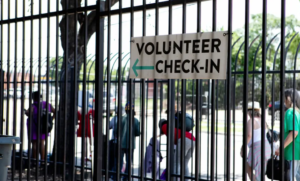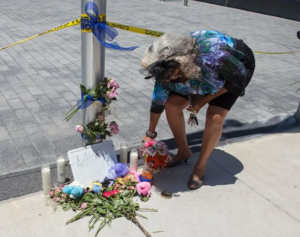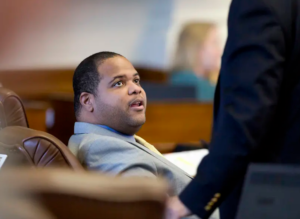How a Dallas salon owner changed Texas’ reopening debate

By April 27, when Gov. Greg Abbott announced that hair salons and barbershops would have to remain shuttered, Shelley Luther’s Salon a la Mode had long since opened for business.
Her stylists trimmed and chatted as Abbott said that restaurants could partially reopen, but not salons, where he said the risk of spreading COVID-19 was higher because of close quarters. As for enforcement, he reminded the news cameras, violators faced a $1,000 fine and up to 180 days in jail.
Luther knew she was operating in blatant defiance of emergency orders from the state and county. She had already torn up a cease-and-desist letter from local authorities, winning loud cheers onstage at an Open Texas rally in Frisco.
But when the governor’s team reached out to her that week, it was not to demand that she close or to threaten the jail time he had warned about. Instead, his advisers sought her guidance: How could they open salons sooner? What safety measures did she recommend?
Just over a week later, Abbott had done what Luther wanted, allowing salons to reopen sooner than anticipated, and Luther was in jail — a Democratic judge in Dallas issued the sentence when she repeatedly refused to close her salon.
She wasn’t the first beautician to find herself in legal trouble for violating coronavirus orders; two Laredo women, Ana Isabel Castro-Garcia and Brenda Stephanie Mata, were arrested in mid-April for offering cosmetic services. But unlike in those cases, Luther’s arrest prompted widespread, sustained outrage on the ideological right, and Abbott joined a cluster of GOP officials in all three branches of government clamoring for her release. After an emergency request from her prominent Republican attorneys, the Texas Supreme Court ordered it.
But while she’s out of jail and her salon is free to operate, Luther’s spotlight hasn’t faded.
She has become a cause celebré on the right and persona non grata on the left. Supporters see a crusader whose protest changed minds at the top levels of government; skeptics see a privileged business owner whose refusal to follow the rules forced a weak governor to change them. And both recognize the emergence of a new quasi-celebrity, appearing on “The View” and headlining rallies across the state, bolstered by half a million dollars in crowdfunded support and a new press team of prominent GOP consultants, whose star shows no sign of fading.
“#Rememberthealamode”
In March, as the new coronavirus was just starting to cause widespread concern in the U.S., Luther drove with her boyfriend, Tim Georgeff, from Dallas to Galveston to board a cruise.
“I have a real good friend who’s a doctor,” Georgeff told a local news station reporting on virus-related fears. “It’s really nothing more than a severe cold.”
As panic ramped up through the end of the month, Luther was at first willing to tolerate the stay-at-home orders that shuttered businesses across the state. But in April she changed her mind, insisting she had to reopen out of economic necessity. She began to make the rounds on local media, telling news anchors she would institute safety protocols like face masks but that she had the right to earn money. (Luther would learn later, in early May, that she had been approved for an $18,000 loan through the federal Paycheck Protection Program.)
Luther, who was not available for an interview but submitted written statements in response to The Texas Tribune, said she was always more focused on helping her stylists get back to work than on sparking a movement.
“Reopening my salon wasn’t a political statement, it was a necessity for the people that rely on it,” she said.
Whatever her intentions, Luther quickly made a splash in political circles.
Her media appearances drew the attention of Rick Hire, who, like Luther, was a member of the Open Texas Facebook group that had agitated for a faster, more complete reopening of Texas businesses. Hire, who runs an IT business near Houston, had once been temporarily suspended from the group and launched a fledgling conservative group called the “Woke Patriots,” a platform for likeminded people to gather “during a period in our nation that has been overshadowed by governmental overreach, and rights infringement.”
He offered to use the website to support Luther, writing that she was the group’s “first patriot cause.” He launched the crowdfunding page April 23.
On April 24, Luther opened her business to a media maelstrom. Cameras and customers waited outside. Online, donations poured in.
So did a letter from Dallas County Judge Clay Jenkins, directing her to shutter the salon immediately. Luther ignored him. In the Open Texas Facebook group, she asked if anyone could help custom print a T-shirt that said, “Cease and Desist Jenkins!”
“#Rememberthealamode,” she wrote, retooling the favorite Texas phrase to play on the name of her salon.
The case against her advanced, with the city of Dallas asking District Judge Eric Moyé to order the salon closed. Moyé, a Democrat elected to his bench in 2008, issued the order April 28. In a Facebook video, Luther said that if she had to “go to jail to prove a point that what they’re doing is totally unconstitutional, then that’s what happens.”
Abbott had warned it could be dangerous to reopen salons, but he also said he wanted to do so as soon as possible. Luther was one of the salon owners his team reached out to that week in an effort to gather information on how they might do so safely. By the end of the week, Luther was on the phone with James Huffines, the head of Abbott’s task force on reopening the state.
Luther said she and Huffines “had some disagreements,” but “I was happy to see the state open up more businesses earlier than they had intended.”
“They have a state of nearly 30 million people they have to think about,” she said. “I was glad they got to hear from people struggling to make ends meet in Dallas.”
Meanwhile, an increasing number of Abbott’s fellow Republicans were growing outraged at the Luther case and more broadly impatient with the delay in reopening salons. The group included several members of the Texas House who do not typically go out of their way to disagree with Abbott.
“Respectfully, ENOUGH!!! You are the only one that can STOP this!!! ENOUGH!!!” state Rep. James White, R-Hillister, tweeted at Abbott that Wednesday, referring to the Luther case.
Montgomery County Judge Mark Keough, claiming Abbott’s directions had been unclear, said he would allow all businesses to reopen. Attorney General Ken Paxton quickly reiterated that Abbott had ordered salons to stay closed, a directive his office said was “neither vague nor unenforceable.”
On May 5, two Texas House Republicans visited a Houston-area barbershop — also open in defiance of emergency orders — for illegal haircuts. One of them, Briscoe Cain, who is a member of Luther’s legal team, called it an “act of civil disobedience.”
Under pressure, Abbott announced hours later that salons could reopen the following Friday.
“I am not going to shut the salon”
But Luther’s staunch supporters had fresh cause for distress: Moyé had sentenced her to seven days in jail. Before doing so, he gave her an opportunity to apologize, telling her if she pledged not to reopen her salon until emergency orders were lifted, he would consider levying only a fine and allowing her to avoid jail time.
Days before the hearing, Luther had received $18,000 in government loans, a sum that could have helped cover costs during the pandemic. But she would later say she wasn’t sure how she was allowed to spend it and felt she couldn’t risk closing.
“I am not going to shut the salon,” she told the judge.
By the first week of May, Luther had retained two well-connected GOP lawyers: Warren Norred, a member of the state Republican Executive Committee who typically focuses on intellectual property disputes, and Cain, one of the state lawmakers who had goaded Abbott by visiting a barbershop.
As the two attorneys fought for her release in court, ultimately appealing to the Texas Supreme Court, Republican officials issued an outpouring of support. Paxton wrote an unusual direct appeal to the Dallas judge, claiming Moyé had abused his discretion and should immediately order Luther’s release. Lt. Gov. Dan Patrick, for his part, offered to pay Luther’s fine and serve seven days of house arrest in place of her jail sentence.
And Abbott joined the chorus, albeit more cautiously, saying he joined Paxton in “disagreeing with the excessive action by the Dallas Judge.”
Among Luther’s most fervent supporters, there was already pressure building for Abbott to pardon Luther. Hours after Abbott weighed in on May 6, he told a radio interviewer it would take longer for a potential pardon to go through the state process than it would for Luther to be able to legally open up — but he left open the possibility of a pardon “down the road.”
As outrage continued to mount that night, Abbott took to Twitter to share a Fox News interview he did on Luther’s case — and to tease some news.
“I’ll make further announcements about this and related issues in the morning,” Abbott said.
The next day, hours before he was due at the White House for an appearance with the president, Abbott retroactively removed the enforcement mechanism from his executive orders, decreeing that confinement was no longer a possible penalty for violating one of them.
“If correctly applied,” wrote Abbott, the state’s former attorney general, his revision should free Luther.
By itself, multiple attorneys said, the order would not have served to free Luther — who had been jailed for contempt of court, not criminal violation of Abbott’s order.
Within hours, the point was moot: The all-Republican Texas Supreme Court ordered Luther’s immediate release.
At the White House, Trump seemed well aware of Luther’s case, bringing it up as Abbott, who was there to discuss Texas’ coronavirus response, said no one should go to jail for violating his orders.
“She’s free today,” Abbott said.
“Good,” Trump replied, later adding, “I was watching the salon owner, and she looked so great, so professional, so good. And she was talking about her children. She has to feed her children.”
At the same meeting, a reporter asked Deborah Birx, the White House coronavirus response coordinator, if she thought Texas’ reopening plan was “great” — the praise that Abbott has repeatedly attributed to her. She said she and Abbott had a “long discussion” on the topic, particularly about holding off on reopening nail salons.
“So we talked about, you know, not having them in the first opening wave, because you can’t really physical distance,” she said. “And we had that discussion and he agreed. And we’ve moved forward together.”
Moments later, Birx declined to say whether Texas is a “role model” for other states.
“Every state is different,” she said in response to a reporter’s question. “So I don’t want to get in comparison with the governors, because I’ve talked to some incredible governors who are all doing quite a good job.”
“They’re afraid, and they should be”
The incident has left harsh blowback for those in Luther’s wake, chief among them Moyé. He was elected to his current bench, the 14th Judicial District Court, in 2008 and won reelection by 18 percentage points when he was last up for reelection in 2016.
Luther’s supporters are now rallying around the Republican challenging Moyé this November, Dallas attorney Jessica Voyce Lewis — a highly unusual level of attention for a down-ballot judicial race in reliably blue Dallas. Patrick promoted her candidacy during an appearance last week on Fox News, saying Moyé “may find out the real reckoning will come in November.” Days later, Trump retweeted a Fox News commentator who said Moyé “should be voted out of office November 3rd.”
“Nothing about what he did in the courtroom surprises me at all,” Moyé’s political consultant, Jeff Dalton, said in an interview. “He’s not politically naive at all, but he’s incredibly apolitical when it comes to the decisions he makes in the courtroom.”
Since the controversy flared up, Dalton said, Moyé’s campaign email has been receiving messages “full of racist terminology” as well as “two lynching threats.” Critics have circulated Moyé’s home address online, and there have been protests there while he has been away that police have monitored.
“This was a very effective publicity stunt by the Tea Party and the far right,” Dalton said.
Meanwhile, now out of jail, Luther is already leveraging her new celebrity status, aided by two Republican consultants. After paying for her own legal bills and the mortgage on her salon, Luther turned her crowdfunded money into a new foundation, Courage to Stand, which she said will support hairstylists and other small businesses “closed by government orders and crushed by the economic fallout.”
Even as some critics accuse Luther of political opportunism, owners of still-shuttered businesses are considering whether to follow her example.
“Texans need to be treated as adults,” she said.
She defended her decision to reopen in an appearance on “The View” on Monday. And on Wednesday, she headlined a Laredo “Freedom Rally” in the border city, where she stood alongside Castro-Garcia and Mata.
“I never expected to be in this situation,” Mata said through tears. Luther came onstage in heeled boots and a black face mask and hugged the younger woman. “We were literally treated like criminals. … I know I wasn’t doing anything wrong.”
“Don’t ever apologize for working! Don’t ever apologize!” Luther cried.
Then she took off her mask, to great applause.
“I just want to say that this obviously got a lot bigger than I thought,” Luther said. “This gained national attention not because I wanted it to but I think it was supposed to. And I just followed my heart.
“A lot of people are like — and this is gonna sound bad — ‘Now, this white lady has all this money — is she gonna contribute to these Hispanic families?’”
Luther pledged to kick off crowdfunding pages for the two women with a total of $2,500 from her own roughly $500,000 in donations.
“It’s not about that,” she insisted. “I don’t care what color you are. … We’re coming together right now, stronger and more fierce than they will ever be able to handle. And they’re afraid, and they should be.”
This article was originally published on How a Dallas salon owner changed Texas’ reopening debate




